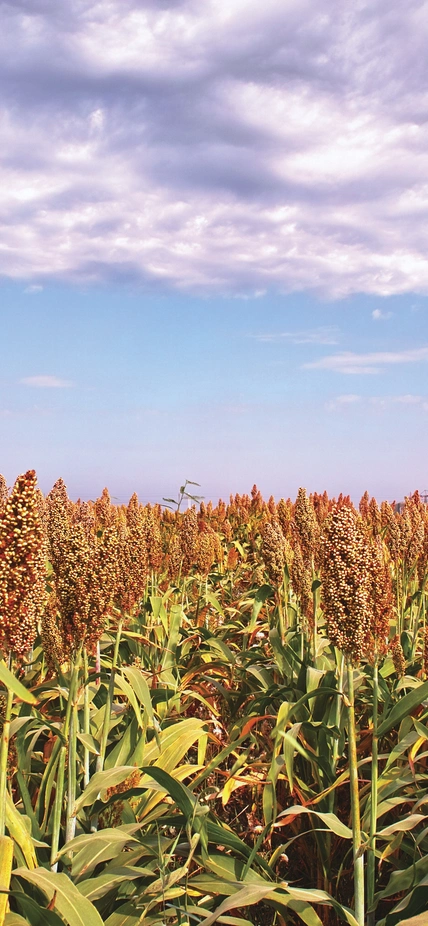Stanford, CA— Carnegie Plant Biology Acting Director Sue Rhee and staff scientist José Dinneny and their labs are part of a research effort led by The Donald Danforth Plant Science Center, one of the world’s largest independent plant science institutes, which today announced a 5-year, $16 million grant from the U.S. Department of Energy.
Building on earlier research using the often-studied model grass called green foxtail (Setaria viridis), this project will identify new genes and pathways that contribute to photosynthesis and enhanced water-use efficiency. The team will then deploy these genes using tools from the emerging field of synthetic biology to accelerate development of so-called elite-energy sorghum varieties for production in marginal environments.
Sorghum is a member of the grass family and is grown worldwide. Sorghum is very resilient to drought and heat stress. Natural genetic diversity in sorghum makes it a promising system for identifying stress-resistance mechanisms in grasses that may have been lost during the domestication of related cereal crops. It is among the most-efficient crops in conversion of solar energy and use of water, making it an ideal crop to target for as a bioenergy feedstock.
“Understanding the network of genes involved in photosynthesis and drought tolerance will provide targets for plant breeders and genetic engineers to re-design sorghum specifically as a high value bioenergy feedstock to be grown on marginal soils and thus not compete with food crops,” said lead principal investigator, Thomas Brutnell director of the Enterprise Institute for Renewable Fuels at the Danforth Center.
This project aims to deliver stress-tolerant sorghum lines, addressing DOE's mission for the generation of renewable energy resources. The development of a low-input, environmentally safe and highly productive sorghum germplasm will help establish a plant biomass energy economy that can provide jobs to rural communities, ensure energy security, and benefit the environment.
The project's strength lies within the multi-disciplinary team’s expertise ranging from plant physiology, genetics, molecular biology, informatics, computational biology and genetic engineering from scientists at Washington State University, University of Rhode Island, University of Illinois and University of Minnesota, in addition to Danforth and Carnegie.
"We're excited to use our computational modeling approaches to find key genes and pathways that will enable sorghum to grow with low input,” Rhee said. “This research program will contribute to sustainable agriculture.”
Top Image Caption: Sorghum photo courtesy of Donald Danforth Plant Science Center.
__________________
The Carnegie Institution for Science (carnegiescience.edu) is a private, nonprofit organization headquartered in Washington, D.C., with six research departments throughout the U.S. Since its founding in 1902, the Carnegie Institution has been a pioneering force in basic scientific research. Carnegie scientists are leaders in plant biology, developmental biology, astronomy, materials science, global ecology, and Earth and planetary science.
Founded in 1998, the Donald Danforth Plant Science Center is a not-for-profit research institute with a mission to improve the human condition through plant science. Research, education and outreach aim to have impact at the nexus of food security and the environment, and position the St. Louis region as a world center for plant science. The Center’s work is funded through competitive grants from many sources, including the National Institutes of Health, U.S. Department of Energy, National Science Foundation, and the Bill & Melinda Gates Foundation. Follow us on Twitter at @DanforthCenter.
